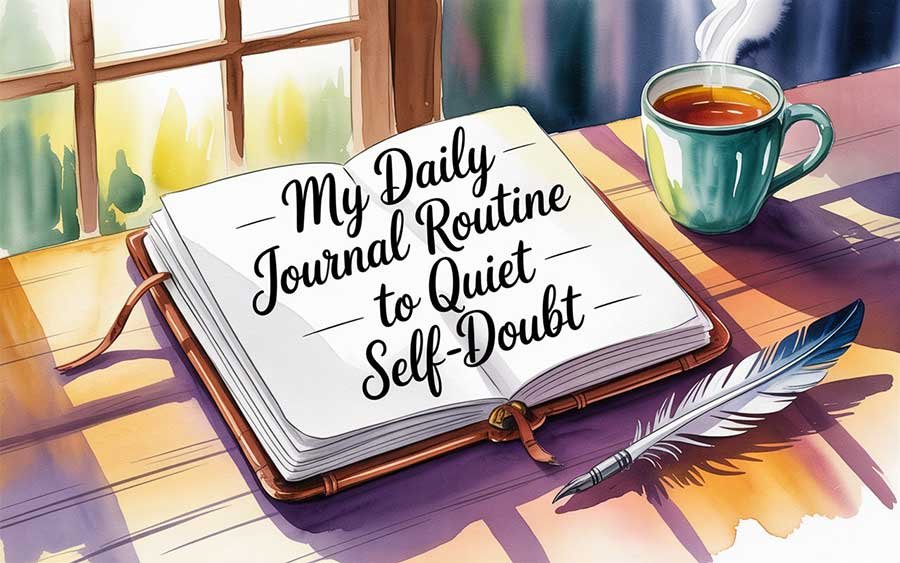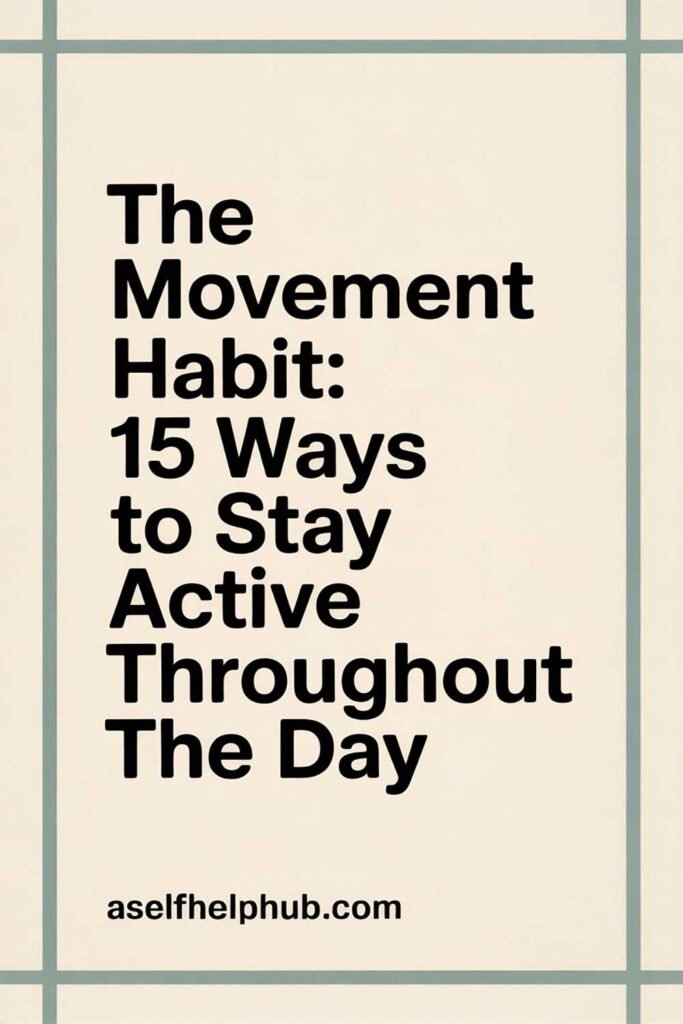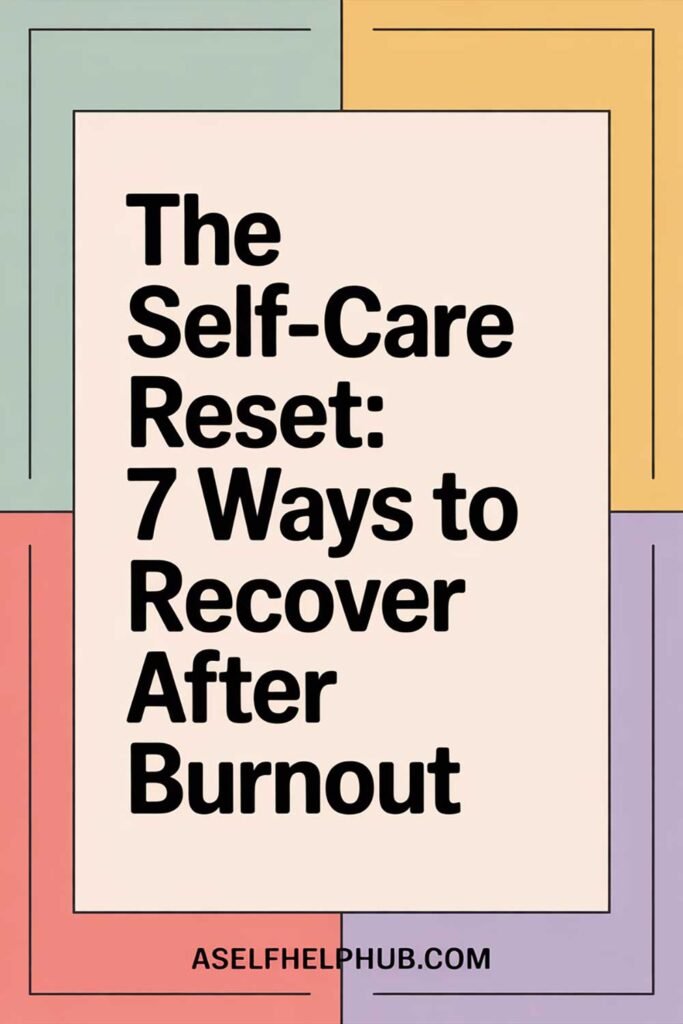
Beyond the Whispers: My Daily Journal Routine to Quiet Self-Doubt and Unleash Inner Confidence
Have you ever had that insidious inner voice whisper, “You’re not good enough”? Or found yourself second-guessing every decision, paralyzed by the fear of making a mistake? For many of us, self-doubt is a relentless companion, a subtle but powerful force that undermines our confidence, stifles our potential, and keeps us playing small. It manifests as procrastination, fear of judgment, missed opportunities, and a pervasive feeling that we’re simply not capable of achieving our dreams. This isn’t just an unpleasant emotion; it’s a profound barrier to living a life of purpose and fulfillment.

For a significant portion of my life, I was held captive by this inner critic. Every new challenge was met with a chorus of “what ifs” and “I can’ts.” I’d compare myself endlessly to others, always finding myself lacking. This constant internal battle was exhausting, leaving me drained, anxious, and perpetually feeling behind. I yearned for the quiet confidence I saw in others, wishing I could silence the relentless whispers of inadequacy that echoed in my mind. I dabbled in journaling before, but it often felt like just writing down my worries, making them feel even bigger. I didn’t understand its true power.
But here’s the profound truth I discovered: self-doubt is not an inherent truth about you; it’s a habit of thought.And like any habit, it can be unlearned, replaced with empowering beliefs through consistent, intentional practice. The most powerful tool I found for this transformation wasn’t external validation or a sudden epiphany; it was the simple, accessible, and profoundly transformative practice of daily journaling. But not just any journaling – a specific, targeted routine designed to uncover, challenge, and ultimately quiet the voice of self-doubt, replacing it with an unshakeable sense of self-belief.
This comprehensive guide is designed to be your ultimate blueprint for leveraging the power of a daily journal routine to conquer self-doubt. We’ll explore the subtle ways self-doubt takes root, demystify the journaling process, and provide you with a powerful, step-by-step routine that will transform your inner landscape. Get ready to turn your journal into a powerful ally, silence your inner critic, and unleash the confident, capable individual you were always meant to be.
Why a Daily Journal Routine is Your Secret Weapon Against Self-Doubt
Journaling is far more than just writing down your thoughts; it’s a therapeutic, introspective practice that offers immense benefits for mental clarity and self-confidence:
- Externalizes Thoughts: Getting thoughts out of your head and onto paper immediately reduces their overwhelming power. You can observe them more objectively, rather than being consumed by them.
- Identifies Patterns: Consistent journaling helps you spot recurring negative thought patterns, triggers, and self-sabotaging behaviors that fuel self-doubt.
- Challenges Limiting Beliefs: It provides a platform to question the validity of your self-critical thoughts, encouraging rational counter-arguments and new perspectives.
- Fosters Self-Awareness: You gain a deeper understanding of your emotions, strengths, weaknesses, and motivations, leading to greater self-acceptance and confidence. This is fundamental to what is self-discovery journaling and why it works.
- Cultivates Gratitude & Positivity: By intentionally focusing on achievements and blessings, you reprogram your brain to seek out the positive, counteracting the negativity of self-doubt. This ties directly into the benefits of keeping a gratitude journal.
- Boosts Problem-Solving: A clear mind, unburdened by doubt, is better equipped to find solutions and take decisive action.
- Reduces Stress & Anxiety: Journaling is a powerful stress reliever, offering a constructive outlet for worries and helping you create a more stress-free life.
A consistent journal routine transforms your inner critic into an inner coach, guiding you toward greater self-belief and action.
My Daily Journal Routine to Quiet Self-Doubt: A Step-by-Step Blueprint
This routine is designed for intentionality and impact, typically taking 15-20 minutes, but adaptable to less. The key is consistency and honest engagement.
Phase 1: The Morning Anchor (Setting a Confident Tone)
I begin my day with a journaling practice that primes my mind for clarity and self-belief. This is my proactive shield against the day’s potential doubts.
1. The Brain Dump & Release (5 minutes)
- The Habit: Immediately after waking (and before checking my phone or engaging with external stimuli), I grab my journal and quickly write down everything that’s on my mind. No filter, no judgment, no organization. This includes worries, anxieties, lingering dreams, random thoughts, initial to-dos, or any negative feelings that might be surfacing. It’s a mental purge.
- Why it Quiets Self-Doubt: This simple act externalizes mental clutter and negative chatter. By getting it out of your head and onto paper, it immediately reduces its power. You can observe your thoughts rather than being consumed by them, creating mental space for clarity. It’s often the hardest part of starting, so if you’re struggling, consider insights from How to Start Journaling When You Don’t Know What to Write.
- Real-Life Example: Sarah, a notoriously anxious overthinker, used to wake up with her mind instantly racing through worst-case scenarios. She started her day with a brain dump. “The moment I get those swirling anxieties onto paper, it’s like deflating a balloon,” she shares. “They stop feeling so overwhelming, and I can actually move on to intentional thinking, rather than just worrying.”
2. The Thought Challenge & Reframe (5-7 minutes)
- The Habit: After the brain dump, I re-read any negative or self-doubting thoughts that emerged. I then consciously challenge them using a set of questions:
- “Is this 100% true? Always?” (Often, the answer is no.)
- “What evidence do I have to support this thought?” (Usually, very little.)
- “What evidence contradicts this thought?” (Focus on past successes, strengths, compliments).
- “Is this thought helping me or harming me?”
- “What would I tell a friend who had this exact thought?”
- Finally, I reframe the negative thought into a more realistic, balanced, or empowering belief.
- Example: Negative: “I’m going to mess up this presentation.”
- Challenge: “I’ve done presentations successfully before. I’m prepared. A small stumble isn’t a total failure. This thought makes me anxious and less effective.”
- Reframe: “I am prepared, I have valuable insights, and I will deliver this presentation effectively. Even if I stumble, I can recover, and my message is what matters.”
- Why it Quiets Self-Doubt: This is the direct attack on self-doubt. You’re training your brain to question its negative programming, weakening those neural pathways and building new, empowering ones. It’s active cognitive restructuring.
- Real-Life Example: Mark used to constantly second-guess his ideas at work, telling himself, “My ideas aren’t creative enough.” After journaling this, he’d challenge it: “Is that true? I came up with X and Y ideas last month that were well-received. That thought makes me hold back.” He’d reframe: “My creativity brings unique solutions. I will share my ideas confidently.” This consistent internal work led to him speaking up more in meetings and getting positive recognition.
3. The “Evidence & Accomplishment” Scan (3-5 minutes)
- The Habit: I take a few minutes to actively list 3-5 specific accomplishments or pieces of “evidence” from the past 24-48 hours that demonstrate my capabilities, strengths, or positive qualities. These don’t have to be grand achievements; they can be small wins.
- Examples: “Successfully completed that tricky report.” “Listened patiently to a friend.” “Helped a colleague with a problem.” “Stuck to my workout goal.” “Learned something new about X.” “Made a healthy meal choice.”
- Why it Quiets Self-Doubt: Self-doubt often stems from focusing on perceived flaws or failures. This habit actively retrains your brain to seek and register evidence of your competence, resilience, and worth. Over time, this overwhelming positive “evidence” creates a powerful, undeniable counter-narrative to your inner critic.
- Real-Life Example: Jessica often felt overwhelmed by her to-do list and doubted her capacity to handle it all. She started listing 3 things she accomplished each day. “Even if it was just ‘responded to all emails’ and ‘made a healthy dinner,’ it showed me I was consistently doing things,” she said. “It built a mountain of tiny wins that eventually crushed the feeling of ‘not doing enough.'”
Phase 2: The Evening Integration (Reinforcing Beliefs for Restful Sleep)
My evening journal practice is about processing the day and solidifying positive beliefs for a calm mind before sleep.
4. The Daily Reflection & Learning (5-7 minutes)
- The Habit: Before winding down for the night, I open my journal again. I reflect on the day that has passed, focusing on:
- Highlights: What were the positive moments? What went well?
- Challenges/Lessons: What was difficult? What did I learn from it? How did I handle it? (Applying the “What can I learn from this?” mindset).
- Emotions: What emotions did I experience, and what were their triggers?
- Alignment: Did my actions today align with my values?
- Why it Quiets Self-Doubt: This mindful review helps process the day’s events, preventing them from festering into late-night worries. By extracting lessons, you transform setbacks into growth opportunities, reinforcing your capability and reducing the chance for self-criticism to take hold. This daily reflection provides clear data points for personal clarity, a key aspect of Daily Journal Prompts for Personal Clarity.
- Real-Life Example: Tom used to replay stressful work conversations endlessly at night, fueling his self-doubt. His evening reflection habit helped. “I’d write down the stressful interaction, then analyze it calmly,” he explained. “Did I handle it well? What could I do differently? This process helped me ‘close the loop’ on the day’s challenges, so my brain wasn’t still trying to solve them when I was trying to sleep.”
5. Gratitude & Affirmation (3-5 minutes)
- The Habit: I end my evening journaling with a dedicated gratitude practice. I list 3-5 things I am genuinely grateful for from the day, no matter how small. I then write down 1-3 powerful affirmations that reinforce the empowering beliefs I’m cultivating (e.g., “I am resilient,” “I trust my intuition,” “I am worthy of success”).
- Why it Quiets Self-Doubt: Gratitude actively rewires your brain to seek and register the positive, directly counteracting the negativity of self-doubt. Affirmations, when repeated consistently and with feeling, reinforce new, empowering neural pathways, creating a positive subconscious belief system that supports confidence.
- Real-Life Example: Andrew, who battled with feeling “not good enough,” started listing specific gratitudes every night. “A sunny walk, a genuine laugh with a friend, the simple comfort of my bed,” he listed. He also affirmed, “I am capable. I am worthy.” “It changed my emotional state before bed,” he shared. “I went to sleep feeling lighter and more positive, which meant I woke up feeling less burdened by self-doubt the next morning.”
Making This Daily Routine Stick: Practical Advice for Long-Term Confidence
Cultivating this journal routine is a marathon, not a sprint. Be patient, be persistent, and be kind to yourself.
- Start Small: Don’t try to implement the entire routine at once. Pick one segment (e.g., the 5-minute morning brain dump) and commit to it for a week. Once it feels natural, add the next step. Consistency in a small routine is far more powerful than perfection in an unsustainable one.
- Choose Your Tools Wisely: Whether it’s a beautiful physical notebook and pen that makes you excited to write, a simple text document, or a journaling app, pick something you’ll actually use consistently. The “perfect” tool is the one you stick with. If you’re using a digital tool, you might even be able to track goals, like managing money, using a bullet journal method, as seen in How to Use a Bullet Journal to Track and Hit Your Money Goals.
- Be Consistent, Not Perfect: You will miss days. You will feel unmotivated sometimes. That’s okay. Don’t let a missed day derail your progress. Simply acknowledge it, and gently return to your routine the next day. The cumulative effect of showing up matters most.
- Stack Your Habits: Link your journaling practice to existing habits. For example, “After I make my coffee, I will open my journal.” “Before I read my book at night, I will do my evening reflection.”
- Create a Sacred Space: Designate a quiet, comfortable spot where you do your journaling. This can be your bed, a favorite chair, or a corner of your desk. Making it a ritual enhances adherence.
- Re-read Your Progress: Periodically, go back and read old entries. You’ll be amazed at how far you’ve come, the negative thoughts you’ve overcome, and the patterns you’ve broken. This tangible evidence of growth is a powerful confidence booster.
- Connect to Your “Why”: Remind yourself why you’re doing this – to quiet self-doubt, to feel more confident, to achieve your dreams, to live authentically. This deeper motivation will fuel your consistency when willpower wanes.
Picture This…
Imagine waking up not with the heavy weight of self-doubt, but with a quiet sense of calm and clarity. You sit down with your journal, releasing any lingering worries onto the page, then consciously choosing empowering thoughts to guide your day. You track your small wins, building a mountain of evidence that proves your capabilities. As the day unfolds, the whispers of inadequacy might still appear, but they no longer paralyze you. You acknowledge them, challenge them with the truth you’ve documented, and confidently step forward, knowing you are inherently capable, resilient, and worthy. Your decisions feel clearer, your actions are more decisive, and you experience a profound sense of inner peace that comes from truly believing in yourself. This isn’t just about reducing self-doubt; it’s about unlocking your full potential and living a life of genuine confidence, purpose, and joyful self-acceptance.
20 Powerful Quotes on Journaling & Self-Doubt
- “The unexamined life is not worth living.” – Socrates
- “What lies behind us and what lies before us are tiny matters compared to what lies within us.” – Ralph Waldo Emerson
- “Journaling is the ultimate self-care practice.” – Unknown
- “You are not your thoughts; you are the observer of your thoughts.” – Unknown
- “The mind is everything. What you think you become.” – Buddha
- “Every day, in every way, I’m getting better and better.” – Émile Coué
- “Self-doubt kills more dreams than failure ever will.” – Unknown
- “Journaling is therapy on paper.” – Unknown
- “You gain strength, courage, and confidence by every experience in which you really stop to look fear in the face. You must do the thing you think you cannot do.” – Eleanor Roosevelt
- “The greatest discovery of all time is that a person can change his future by merely changing his attitude.” – Oprah Winfrey
- “Write hard and clear about what hurts.” – Ernest Hemingway (For emotional processing).
- “Until you make the unconscious conscious, it will direct your life and you will call it fate.” – Carl Jung
- “The inner critic is a liar. Don’t believe its stories.” – Unknown
- “Self-awareness is not just about what you think of yourself. It’s also about what you don’t think of yourself.” – Tasha Eurich
- “A journal is a place for your thoughts to exist without judgment.” – Unknown
- “Your worth is not based on your productivity.” – Unknown
- “The privilege of a lifetime is to become who you truly are.” – Carl Jung
- “Don’t let the noise of others’ opinions drown out your own inner voice.” – Steve Jobs
- “The consistent pursuit of personal excellence, fueled by values and purpose, is a powerful force.” – Unknown
- “You are stronger than you think.” – Unknown
Disclaimer
Please note: This article is for informational purposes only and is based on personal experiences, general self-help principles, and anecdotal evidence. While a daily journal routine can be profoundly beneficial for managing self-doubt and boosting confidence, it is not a substitute for professional mental health diagnosis, treatment, or therapy. If you are experiencing severe or persistent self-doubt, anxiety, depression, or other mental health concerns, please consult with a qualified mental health professional or healthcare provider. Always consider your unique circumstances and seek professional help when needed.
Share This Article!
Are you ready to silence the whispers of self-doubt and unlock your true potential? If this daily journal routine has inspired you, please share it with friends, family, or on your social media! Let’s empower more people to cultivate inner confidence and live a life driven by self-belief.






